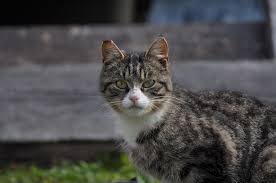Abandoning your cats can lead to serious illness

Feline immunodeficiency virus commonly known as FIV, is a lentivirus that affects cats worldwide. The virus is slow acting, once the disease takes hold of the cat’s immune, its system severely weakened.
A lentivirus is any of a group of retroviruses producing illnesses characterized by a delay in the onset of symptoms after infection.
According to Vet Cornell, approximately 1.5 to 3 percent of healthy cats are infected with FIV in USA. Worldwide, it has affected 11%.
FIV has five subtypes that have been identified based on nucleotide sequence. FIV is the only non-primate lentivirus to cause an AIDS-like syndrome. FIV is not typically fatal for cats, as they can live relatively healthily as carriers and transmitters of the disease for many years.
Symptoms will not show until years after initial infection occurs. Symptoms of FIV include enlarged lymph nodes, fever, anemia, weight loss, disheveled coat, poor appetite, diarrhea, sneezing, discharge from eyes or nose, behavior change, frequent urination, straining to urinate or urinating outside of the litter box, dental disease, wounds that don’t heal, inflammation of the mouth, abnormal appearance or inflammation of the eye, skin redness or hair loss.
Infected cats who receive supportive medical care and are kept in stress free environments and are also kept indoors can live relatively comfortable lives for months to years before the disease reaches its chronic stage. FIV makes cats susceptible to various infections. Many people confuse FIV with FELV, Feline Leukemia Virus, although they are different diseases they do cause similar secondary symptoms.
FIV is routinely diagnosed by blood testing. The most common type of test looks for presence of antibodies to the virus in the blood which indicates infection. The test is frequently administered as part of a “combo” used test to detect FeLV. No test is 100% accurate. The veterinarian will interpret test result and determine whether further testing is needed. Once a cat is determined to be FIV positive, that cat is capable of transmitting the disease to other cats.
To treat FIV, cat owners should have their pet on medication and should work on their diet. The infected cat will be put on an anti-viral drugs can help some cats but treatment is usually limited to supportive care and dealing with secondary health concerns as they arise. The diet and nutrition of the cat is essential to maintaining optimal immune function in FIV positive cases.
Treatment for FIV includes fluid and electrolyte replacement therapy, anti inflammatory drugs, immune enhancing drugs and parasite control. Most common cause of deaths among senior cats are kidney failure, cancer, FIV, hyperthyroidism, inflammatory bowel disease, diabetes, arthritis and dental disease.
According to WebMD, FIV is transmitted from cat to cat through deep bite wounds, usually from aggressive fights and territorial disputes. Free roaming aggressive male cats are most frequently infected. A lesser common mode of transmission is FIV infected mother to kitten through either birth or feeding. A much lesser common mode of transmission is spread through sharing bowls or litter boxes, social grooming, sneezing and other casual modes of contact.
A person cannot catch FIV from an infected cat. It can only be transmitted cat to cat. Feline Immunodeficiency Virus is not HIV, the virus that causes AIDS in humans.
If an infected mother transfers FIV antibodies to her kittens, the kittens may test positive from mother’s antibodies until they have cleared them from their systems; which happens by six months of age. If a kitten is tested positive for FIV antibodies when they are young, they should be checked again later to see if they are infected.
FIV negative cats and FIV positive cats can still live together. If the cats do not fight, there will be no worry. But if the cats do fight, keeping them in separate rooms until confident that they will not fight and be aggressive is a recommended option to do.
If FIV goes untreated secondary infections can progress into life threatening conditions. Cats with FIV can develop various forms of cancer, blood diseases or kidney failure. Which would end up ending the poor kitten’s life.
A cat infected with Feline Immunodeficiency Virus is likely to die younger than an uninfected cat. Depending on if the infected cat has avoided getting secondary infections, an infected cat can live anywhere from 2 to 3 years or 10 to 12 years. Both not uncommon.
To prevent FIV from affecting your cat, FIV vaccines are available but may not protect all cats. The best option is to keep cats indoors, avoid contact with infected cat, keep leash on and make sure any contact your cat comes in contact with is FIV negative.
Another way to help prevent of the disease spreading is to report to your local animal shelter or local veterinarian that there are stray or roaming cats in your neighborhood.
74 to 96 million cats are owned in the US which means 30-37% of families do own cats. If every cat owner kept their cat inside this would help prevent the spread of Feline Immunodeficiency Virus.
Another way to help prevent of the disease spreading is to report to your local animal shelter or local veterinarian that there are stray or roaming cats in your neighborhood.
Approximately 70 million stray cats live in the United States and roughly 3.4 million cats enter shelters every year. Each year 1.4 million cats are euthanized and only 1.3 million cats find forever homes.
According to the American Humane Society, the most common reason why people relinquish their cats are that: 21% are not allowed in place of residence and 11% have allergies.
Most states have a law against animal cruelty and neglect, making it illegal to cause harm to an animal, but not all states mention abandonment.
By abandoning your cat you put him or her at risk. Putting your cat on the streets to fend for themselves will cause territorial problems among other cats. Cats have always been very possessive and defensive so when a new cat comes around looking for a home and food.. others may not like it and will attack. If the cat that attacks has FIV, there’s a likely chance that the cat you once owned has FIV.
If you do own cats, keep up to date on their shots, making sure that your cat is up to date on their shots improves not only their health but will lower any risk of your cat from catching anything.

I am a senior and am in Journalism 1. I enjoy reading, writing and binge watching Netflix with my cat.








Stephen Torres • Feb 15, 2017 at 11:43 am
Really interesting topic! I’m gonna link this to every cat owner I know